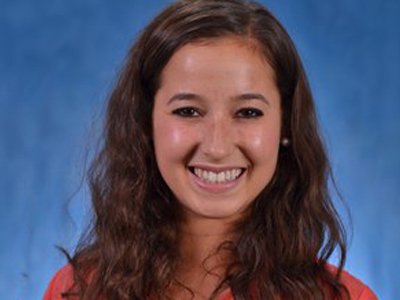Eying Medicine's Glass Ceiling
Syracuse alumna brings passion for science, patient care to fight against diabetes

Anna Kahkoska ’13 explores health problems from all angles.
Currently enrolled in the M.D.-Ph.D. program at University of North Carolina at Chapel Hill, she brings her enthusiasm for science and passion for patient-centered care to her research in childhood diabetes. The medical field increasingly recognizes diet as a leading factor in both the development and treatment of disease, including type 1 and type 2 diabetes. In the same vein, Kahkoska’s work combines nutrition science knowledge with public health tools to improve health across populations and combat this global health threat.
“There are so many layers that play into how nutrition can impact on disease prevention and progression,” she says. With training in topics as diverse as analytical chemistry and clinical care, Kahkoska draws on her broad skill set—and deep love of science— to tackle major world health challenges.
From her first visit to Syracuse as a Coronat Scholarship candidate, Kahkoska was drawn to the sciences. During her senior year of high school she interviewed with Robert Doyle, professor of chemistry, and jumped at the chance to join his lab group. During her years in the Doyle lab, she worked at the interface of inorganic chemistry and biology to create and describe new imaging tools using vitamin B12.
“I caught the ‘research bug’ while working in Robert Doyle’s lab at Syracuse, something that remains at the core of my training today,” Kahkoska says.
Not wanting to leave research behind in her pursuit of a medical degree, Kahkoska investigated M.D.-Ph.D. programs at the suggestion of advisors Cathryn Newton, professor of earth sciences and College of Arts and Sciences dean emerita, and Samuel Gorovitz, professor of philosophy during her time as part of the Renée Crown Honors Program.
In preparation for the competitive application process, she connected with neighboring SUNY Upstate for clinical experience and found an outstanding mentor in Ruth Weinstock. Weinstock, a distinguished service professor of medicine, research professor of neuroscience and physiology, and the division chief of endocrinology, diabetes and metabolism, introduced Kahkoska to clinical research and patient interaction at the Joslin Diabetes Center in Syracuse.
“Since volunteering with the clinical research team at the Joslin Diabetes Center, I have remained committed to service and research in diabetes.” Kahkoska says.
She continues feeding her passions for research and service in Chapel Hill. Currently beginning her fifth year in the eight-year program, Kahkoska works on her doctoral research and coursework in the department of nutrition in the Gillings School of Global Public Health, while also engaging in community outreach.
“Translation from rigorous nutrition research all the way through one-on-one patient interaction requires consideration of behavioral science and the effects of health inequity to overcome the complexities that dominate these disease pathways” she says.
To that end, Kahkoska studies weight management optimization in conjunction with blood sugar control as part of a treatment plan for type 1 diabetes. She’ll employ a precision medicine approach that considers differences between patients to guide individualized treatments.
Working with renowned childhood diabetes expert and chair of the department of nutrition Beth Mayer-Davis, Kahkoska brings together behavioral, epidemiological and statistical approaches to explore drivers of clinical outcomes across different patient groups—and develop helpful strategies.
“One of my favorite things about my research at Syracuse was its interdisciplinary nature,” Kahkoska says. “I love my research at UNC for similar reasons: studying nutrition and chronic disease integrates aspects of metabolism, physiology, behavior, and even the environment.”
Kahkoska’s ingenuity and passion also led to novel diabetes treatments in Burlington, North Carolina, at the Open Door Clinic, a free clinic for uninsured patients in Alamance County. Recognizing that modifying behavior is just as important as physiological interventions in diabetes treatment, Kahkoska initiated appointments shared by multiple patients—efforts rewarded with an Albert Schweitzer Fellowship. Patients at the clinic now share monthly medical appointments, increasing caregiver interactions and peer support.
“Understanding the complex and specific barriers that underserved, type 2 diabetes patients face in the real world has informed how I think about my dissertation research on kids and adolescents with type 1 diabetes,” Kahkoska says. “Together, the experiences challenge me to find new solutions to some of the most challenging aspects of chronic disease management.”
Kahkoska is exploring the possibility of bringing the shared medical appointments model to other free clinics under the supervision of UNC doctors Laura Young, assistant professor of medicine, and John Buse, professor of medicine, chief of the Division of Endocrinology and director of the Diabetes Care Center and the North Carolina Translational and Clinical Sciences Institute, both at UNC.
Kahkoska credits her experiences at Syracuse for her continued passion for research and interdisciplinary thinking. From a summer abroad at Trinity College in Dublin, to developing an honors capstone thesis, to playing Ultimate Frisbee with Fox Force Seven, she is grateful for the support received at her alma mater.
“The people that I worked with most closely as an undergrad continue to mentor me in my graduate studies,” Kahkoska says. “These ongoing relationships speak to the lasting network that Syracuse builds for its students.”
Featured
Robert Doyle Jack and Laura H. Milton Professor and Dean's Professor of Chemistry
